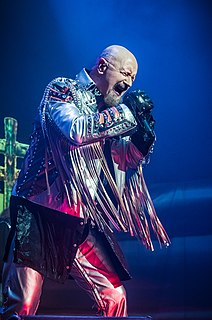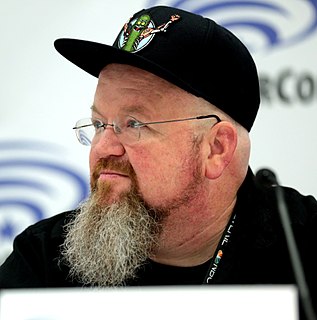A Quote by Gretchen Rubin
A book is a better way to develop a complicated idea, or to tell a big story and to show how ideas weave in and out of each other, which is something that comes up a lot in happiness because all these ideas are interconnected.
Related Quotes
The ideas always have to be in service of the story. And that's what Scott and the writers did - they weren't trying to beat you over the head with an idea; they had a story they wanted to tell, and they had ideas, so they used the story as a way of fleshing out the ideas. It all depends on where they want to go with it.
Let's get one thing clear right now, shall we? There is no Idea Dump, no Story Central, no Island of the Buried Bestsellers; good story ideas seem to come quite literally from nowhere, sailing at you right out of the empty sky: two previously unrelated ideas come together and make something new under the sun. Your job isn't to find these ideas but to recognize them when they show up.
The best way to get kids to read a book is to say: 'This book is not appropriate for your age, and it has all sorts of horrible things in it like sex and death and some really big and complicated ideas, and you're better off not touching it until you're all grown up. I'm going to put it on this shelf and leave the room for a while. Don't open it.
You have to have a lot of ideas. First, if you want to make discoveries, it's a good thing to have good ideas. And second, you have to have a sort of sixth sense-the result of judgment and experience-which ideas are worth following up. I seem to have the first thing, a lot of ideas, and I also seem to have good judgment as to which are the bad ideas that I should just ignore, and the good ones, that I'd better follow up.
I never think of an entire book at once. I always just start with a very small idea. In 'Holes,' I just began with the setting; a juvenile correctional facility located in the Texas desert. Then I slowly make up the story, and rewrite it several times, and each time I rewrite it, I get new ideas, and change the old ideas around.
Three elements go to make up an idea. The first is its intrinsic quality as a feeling. The second is the energy with which it affects other ideas, an energy which is infinite in the here-and-nowness of immediate sensation, finite and relative in the recency of the past. The third element is the tendency of an idea to bring along other ideas with it.
Here is how you know someone has had a good idea: Other people freely admit to their friends that said idea has changed their lives. Most people today will grant that fire and the wheel are the big two. After that, any attempts to rank the greatest ideas of all time are going to draw lots of argument. You’ll have zealots pimping this god or that on the one hand, scientists pimping Darwin on the other, and then practical people pointing at written language and saying, look, fellas, the reason those ideas have gone viral is because someone figured out how to write them down.
a novel is not born of a single idea. The stories I've tried to write from one idea, no matter how terrific an idea, have sputtered out and died by chapter three. For me, novels have invariably come from a complex of ideas that in the beginning seemed to bear no relation to each other, but in the unconscious began mysteriously to merge and grow. Ideas for a novel are like the strong guy lines of a spider web. Without them the silken web cannot be spun.


































